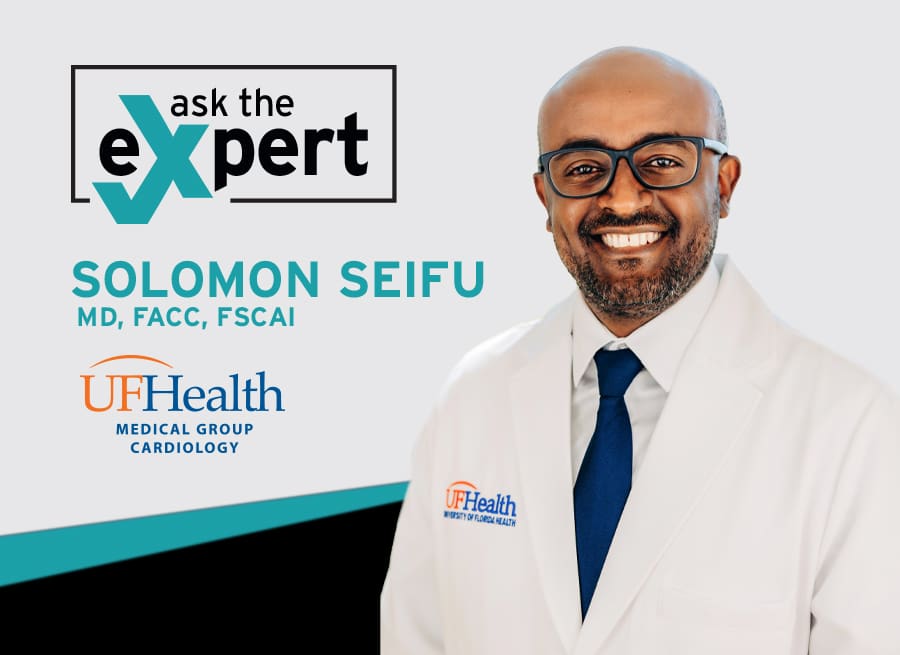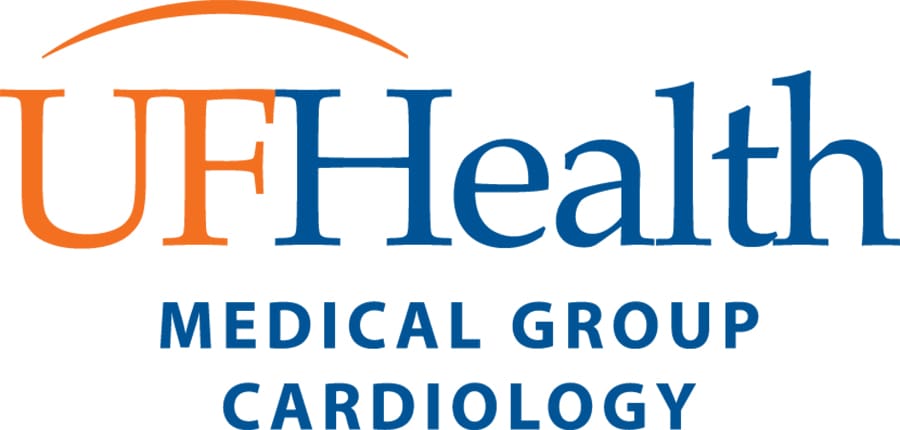
By Akers Editorial
Ask The Expert: Cardiology

Expert: Solomon Seifu, MD, FACC, FSCAI
As a board-certified interventional and structural cardiologist at UF Health Medical Group Cardiology, Dr. Seifu addresses all types of cardiac issues.
What is your training and background, including fellowships and board certifications?
I did internal medicine residency training at Saint Agnes Healthcare in Baltimore, Maryland. I then moved to New Orleans to do general cardiology fellowship training at Louisiana State University (LSU). I pursued further training in interventional cardiology, as well as a structural heart disease interventions fellowship, at the University of Miami. I am board certified in internal medicine, general cardiology and interventional cardiology. Also, I have board certifications in adult echocardiography and nuclear cardiology, as well as cardiovascular CT scan.
What are the most common conditions or diseases treated in your practice?
My areas of focus are atherosclerotic heart disease, valvular heart disease, congestive heart failure and cardiac arrhythmias. Common conditions I treat include clogged arteries, heart attack, congestive heart failure, irregular heartbeats, leaky valves and blocked valves.
What are some of the most common procedures you perform in interventional cardiology?
As a cardiac interventionalist, I do a variety of cardiac procedures, including catheterizations, angioplasties and stenting procedures, transcatheter aortic valve replacement (TAVR), transcatheter mitral valve repair or replacements (TMVR), left atrial appendage closure procedures, and paravalvular leak closure procedures.
How do you diagnose and manage complex heart conditions?
The first step is always to take a detailed history from the patient and perform a physical examination. Depending on the patient’s presentation, we may then perform a variety of cardiac tests. These may include, but are not limited to, blood work, electrocardiogram, echocardiogram, transesophageal echocardiogram, stress testing, heart monitoring, cardiac CT and MRI, and cardiac catheterization.

What role does preventive care play in your practice, and how do you educate patients about it?
Preventive cardiology plays a significant role in patient care. When cardiovascular risk can be modified with early intervention, it’s very likely that the patient will face reduced risk of morbidity and mortality, not to mention reducing the socioeconomic burden associated with the condition. In our practice, we address preventive strategies on each visit to help patients take charge of their health. These strategies may include advice and discussions about how to stop smoking, how to have a healthier diet, and ways to engage in regular physical activity.
We know that when we can identify and treat risk factors early in life, this helps prevent end-stage manifestations of longstanding atherosclerotic cardiovascular disease such as stroke, myocardial infarction, peripheral arterial disease, and heart failure.
How do you ensure that patients are well-informed and comfortable with their treatment options?
As a cardiologist, my goal is to ensure that my patients have all the information they need regarding their cardiac issues and treatment strategies. I make it a point to explain in detail the treatment options, including alternatives, risks and benefits. I also think it is imperative to take the time to listen and address my patient’s questions and concerns. This approach helps patients feel confident and make well-informed decisions regarding their care.
What role does patient education play in your practice, particularly regarding lifestyle changes and post-procedure care?
Patient education plays a vital role in patient care. Education helps patients understand their cardiac condition and treatment options. Information helps motivate patients to change their behavior and embrace a healthy lifestyle. After any cardiac procedure, patient education is crucial to make sure patients understand the post-procedure instructions. Another phase of education is explaining the need for any medications and helping the patient avoid and manage potential complications.
How do you address patient anxiety or concerns about interventional procedures?
One of the most important aspects of patient education is helping patients have a clear understanding of their procedures and treatment protocol. I take the time to explain each procedure, including indications, techniques, alternatives, risks and benefits. This is all discussed with the patient in simple and easy to understand language. Patients are always given ample time to think, ask questions and discuss their procedure. A well-informed patient will have less anxiety about their interventional procedures.
Why should a patient choose UF Health Medical Group, Cardiology?
We deliver evidence-based, research proven and up-to-date treatments. Our service is patient centered. We provide comprehensive cardiology care, including preventive measures, diagnostic tests and broad range therapeutic procedures.









































